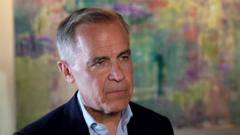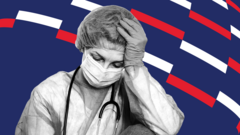Many Americans, like teachers and everyday citizens, express growing dissatisfaction with their health insurance providers following mounting denials for necessary treatments. Highlighted by recent tragedies and increased public scrutiny of insurance practices, the call for reform in the healthcare system intensifies, yet political momentum remains elusive.
'The Healthcare Dilemma': Americans Demand Change After Insurance Denials

'The Healthcare Dilemma': Americans Demand Change After Insurance Denials
Patients voice frustrations as healthcare costs rise and claims are denied, fueling calls for reform in the U.S. healthcare system.
Article Text:
Special education teacher Robin Ginkel has spent nearly two years facing an uphill battle with her insurance company, desperately seeking approval for back surgery recommended by her doctors due to a work-related injury. With a herniated disc causing debilitating pain, Ginkel simply desires to regain her quality of life and return to her job. Yet, after facing multiple rejections for her treatment claims, she expressed feeling exhausted and at a loss, saying, "I can't keep going like this."
Ginkel's struggles are not isolated; a survey by the KFF health policy foundation revealed that approximately one in five Americans with private health insurance reported that their providers had denied care recommended by their physicians last year. Rhode Island resident Brian Mulhern faced a similar fate when his request for a colonoscopy was turned down after his doctor identified polyps on his colon. The refusal forced him to forgo the necessary procedure, leaving him with a $900 bill.
The frustration surrounding healthcare insurance has intensified recently, particularly following the shocking murder of UnitedHealthcare CEO Brian Thompson earlier this month, an event that ignited widespread public rage towards the insurance industry. In the wake of this incident, one insurance provider promptly reversed a controversial decision to limit anesthesia coverage, and stock prices of major firms suffered declines. However, experts warn that resolving the underlying issues of care denials and healthcare frustrations will require decisive action from lawmakers. Yet, recent weeks have shown little progress in Congress, as efforts to advance stalled measures to facilitate claims approvals for government insurance programs remain stagnant.
Many advocates now fear that these ongoing problems could be exacerbated with Donald Trump returning to the presidency. The president-elect's promises to "protect" Medicare, while also pursuing methods to deregulate the healthcare system, pursuing privatization, and cutting spending, creates unease about the future of healthcare coverage in the U.S. David Lipschutz, a co-director at the Center for Medicare Advocacy, voiced concerns, stating, "These actions would only worsen problems, taking health insurance away or limiting access."
The historical backdrop of discontent with the healthcare system in the U.S. continues to grow, with data illustrating that care remains costlier and less effective than in other nations. In 2022, U.S. healthcare spending skyrocketed to over $12,000 per person, nearly double the average in other wealthy countries, according to the Peter G Peterson Foundation. Major reforms, such as those enacted under former President Barack Obama, aimed to expand health insurance access and broaden Medicaid coverage, but pervasive dissatisfaction lingers.
While roughly 40% of Americans receive government-sponsored insurance, the remainder rely on private plans, often leading to rampant complaints. A recent Gallup poll indicated that only 28% of participants rated their healthcare coverage as "excellent" or "good," marking the lowest approval ratings since 2008. Increased prior authorization requirements and escalating claims denials have further impeded access to necessary healthcare services, as evidenced by a 70% rise in Maryland's claim denials over the past five years.
Ms. Ginkel expressed her frustration at the current state of the healthcare system, stating, "It feels like [the companies] do this on purpose in hopes you'll give up." Mr. Mulhern likened the industry's operations to a "legal mafia," commenting on the increasing sense of being unable to receive care even after substantial payments. Despite challenges posed by insurance denials and allegations of for-profit motivations, the lobbying group AHIP claimed that many denials stem from faulty submissions and predetermined coverage decisions.
In the aftermath of Thompson’s murder, hope arose that the heightened scrutiny would spark reform within the insurance industry. Derrick Crowe, a spokesperson for People's Action, emphasized the possibility of transforming this tragic event into a collective movement advocating for responsible and humane healthcare policies. Nevertheless, political will to implement significant reforms remains uncertain, with lawmakers appearing hesitant to progress comprehensive changes in the health insurance framework.
Oscar Morales, a medical expert, noted that the electorate's recent choices indicate a prevailing skepticism towards a publicly financed healthcare structure akin to the UK's National Health Service. He stated, "Distrust of those benefiting from illness arises from the very core of the American system.” As this healthcare crisis continues to unfold, many Americans are left asking what the future holds for their well-being in an increasingly complex insurance landscape.
Special education teacher Robin Ginkel has spent nearly two years facing an uphill battle with her insurance company, desperately seeking approval for back surgery recommended by her doctors due to a work-related injury. With a herniated disc causing debilitating pain, Ginkel simply desires to regain her quality of life and return to her job. Yet, after facing multiple rejections for her treatment claims, she expressed feeling exhausted and at a loss, saying, "I can't keep going like this."
Ginkel's struggles are not isolated; a survey by the KFF health policy foundation revealed that approximately one in five Americans with private health insurance reported that their providers had denied care recommended by their physicians last year. Rhode Island resident Brian Mulhern faced a similar fate when his request for a colonoscopy was turned down after his doctor identified polyps on his colon. The refusal forced him to forgo the necessary procedure, leaving him with a $900 bill.
The frustration surrounding healthcare insurance has intensified recently, particularly following the shocking murder of UnitedHealthcare CEO Brian Thompson earlier this month, an event that ignited widespread public rage towards the insurance industry. In the wake of this incident, one insurance provider promptly reversed a controversial decision to limit anesthesia coverage, and stock prices of major firms suffered declines. However, experts warn that resolving the underlying issues of care denials and healthcare frustrations will require decisive action from lawmakers. Yet, recent weeks have shown little progress in Congress, as efforts to advance stalled measures to facilitate claims approvals for government insurance programs remain stagnant.
Many advocates now fear that these ongoing problems could be exacerbated with Donald Trump returning to the presidency. The president-elect's promises to "protect" Medicare, while also pursuing methods to deregulate the healthcare system, pursuing privatization, and cutting spending, creates unease about the future of healthcare coverage in the U.S. David Lipschutz, a co-director at the Center for Medicare Advocacy, voiced concerns, stating, "These actions would only worsen problems, taking health insurance away or limiting access."
The historical backdrop of discontent with the healthcare system in the U.S. continues to grow, with data illustrating that care remains costlier and less effective than in other nations. In 2022, U.S. healthcare spending skyrocketed to over $12,000 per person, nearly double the average in other wealthy countries, according to the Peter G Peterson Foundation. Major reforms, such as those enacted under former President Barack Obama, aimed to expand health insurance access and broaden Medicaid coverage, but pervasive dissatisfaction lingers.
While roughly 40% of Americans receive government-sponsored insurance, the remainder rely on private plans, often leading to rampant complaints. A recent Gallup poll indicated that only 28% of participants rated their healthcare coverage as "excellent" or "good," marking the lowest approval ratings since 2008. Increased prior authorization requirements and escalating claims denials have further impeded access to necessary healthcare services, as evidenced by a 70% rise in Maryland's claim denials over the past five years.
Ms. Ginkel expressed her frustration at the current state of the healthcare system, stating, "It feels like [the companies] do this on purpose in hopes you'll give up." Mr. Mulhern likened the industry's operations to a "legal mafia," commenting on the increasing sense of being unable to receive care even after substantial payments. Despite challenges posed by insurance denials and allegations of for-profit motivations, the lobbying group AHIP claimed that many denials stem from faulty submissions and predetermined coverage decisions.
In the aftermath of Thompson’s murder, hope arose that the heightened scrutiny would spark reform within the insurance industry. Derrick Crowe, a spokesperson for People's Action, emphasized the possibility of transforming this tragic event into a collective movement advocating for responsible and humane healthcare policies. Nevertheless, political will to implement significant reforms remains uncertain, with lawmakers appearing hesitant to progress comprehensive changes in the health insurance framework.
Oscar Morales, a medical expert, noted that the electorate's recent choices indicate a prevailing skepticism towards a publicly financed healthcare structure akin to the UK's National Health Service. He stated, "Distrust of those benefiting from illness arises from the very core of the American system.” As this healthcare crisis continues to unfold, many Americans are left asking what the future holds for their well-being in an increasingly complex insurance landscape.





















